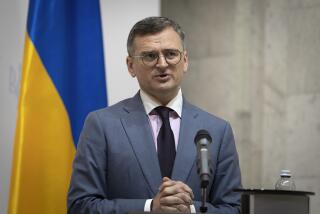Gorbachev Demotes Chief Rivals in Major Shake-Up : Gromyko Also Exits Politburo
MOSCOW — Kremlin leader Mikhail S. Gorbachev engineered the most radical power shake-up of his political career today, retiring President Andrei A. Gromyko and shifting No. 1 conservative rival Yegor K. Ligachev from chief of ideology to farming.
At an urgently summoned meeting of the Communist Party Central Committee, Gorbachev removed four other top figures, including senior foreign affairs expert Anatoly F. Dobrynin, from the leadership and gave a new job to KGB chief Viktor M. Chebrikov.
The Kremlin’s new ideology chief, Yadim A. Medvedev, told a news conference the shifts represent a clear gain for Gorbachev in his perestroika reform drive.
“The course of perestroika is advancing steadily,” Medvedev, 59, declared after announcing the changes. He said the 300-strong Central Committee had met for less than an hour and approved the stunning reshuffle unanimously.
Gromyko, 79, served as the stony-faced foreign minister for three decades before moving into the ceremonial post of president in 1985. He served under every Soviet leader except V. I. Lenin.
The four men who retired alongside Gromyko are Mikhail S. Solomentsev, Pyotr N. Demichev, Vladimir I. Dolgikh and Dobrynin.
Full Member of Politburo
Solomentsev, like Gromyko, was a full member of the party’s ruling Politburo and headed the party’s powerful watchdog body.
Dolgikh and Demichev were candidate, or non-voting, members of the body, and Dobrynin was a Central Committee secretary who earlier served for 24 years as Soviet ambassador to Washington.
Medvedev, who announced his own promotion into the Politburo, said Ligachev, 67, will become head of a new permanent Central Committee commission on agriculture.
Ligachev became ideology chief and effective Kremlin No. 2 in April, 1985, one month after Gorbachev took office. But his conservative approach to many aspects of reform made him appear at odds with the Kremlin leader.
In his new post, Ligachev will oversee party policy on improving food supplies, a Gorbachev priority and one of the toughest problems on the reform agenda.
Chebrikov, who also expressed alarm that democratization under Gorbachev might be getting out of hand, was appointed a secretary of the Central Committee and head of a new commission on legal policy.
This signaled his impending departure from the KGB security police--possibly at an urgent session of the Supreme Soviet, the country’s parliament, on Saturday.
Gorbachev Choice Likely
The parliamentary session will almost certainly also choose a successor to Gromyko as president--probably Gorbachev.
All five who stepped down, Medvedev said, were retiring on a pension. He told reporters Gorbachev himself announced to the plenum that Gromyko wanted to retire.
“Comrade Gorbachev noted the merits and achievements of Comrade Gromyko before the party and the Soviet state and wished him all the best,” the new Politburo member said.
In a speech to the meeting reported by Tass, the 79-year-old Gromyko said he was sad to be leaving the leadership “but age is a stubborn thing and one has to take it into account.”
The veteran figure, a fixture on the world diplomatic scene for almost five decades, expressed his “decisive support” for the policies promoted by Gorbachev.
The departure of the tall, jovial Dobrynin, longtime ambassador to Washington before his recall two years ago to become head of the Central Committee’s International Department, came as a major surprise.
The 68-year-old Dobrynin, despite his long association with past policies, had appeared to be an invaluable source of knowledge in Gorbachev’s drive for closer relations with the United States.
More to Read
Sign up for Essential California
The most important California stories and recommendations in your inbox every morning.
You may occasionally receive promotional content from the Los Angeles Times.










